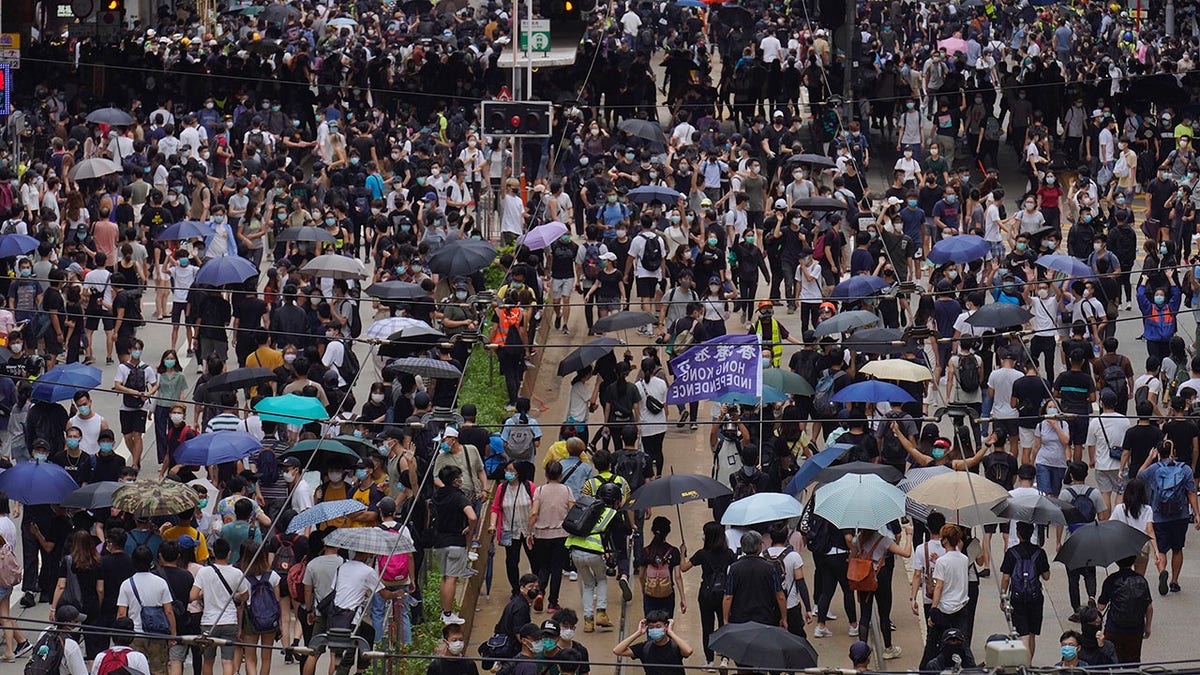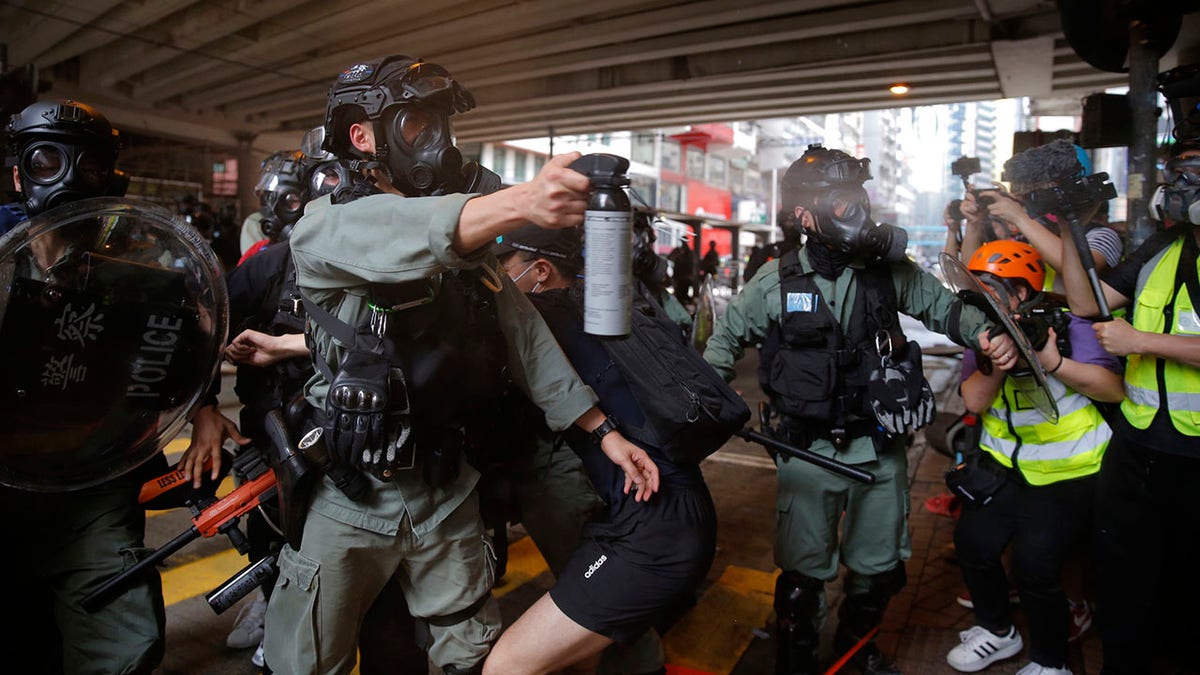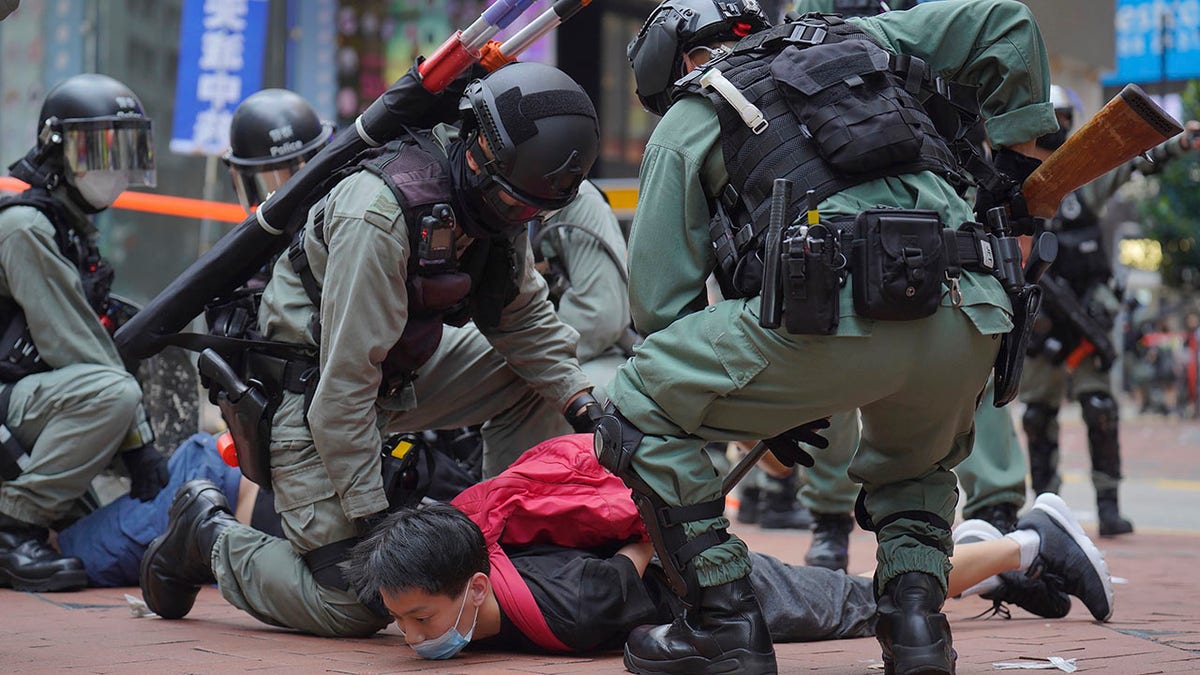China moves to tighten reins on Hong Kong
Chinese crackdown on Hong Kong rights sparks outrage; analysis from Fox News senior strategic analyst Gen. Jack Keane.
Police in Hong Kong fired tear gas and a water cannon at protesters Sunday as thousands rallied in the streets against China’s move to impose a new national security law on the semi-autonomous city.
Crowds of demonstrators dressed in black flouted coronavirus social distancing measures to gather in the Causeway Bay district, a popular shopping area, and chant slogans such as “Stand with Hong Kong," “Liberate Hong Kong” and “Revolution of our times.”
TRUMP'S NATIONAL SECURITY ADVISER SAYS CHINA RESPONSE TO CORONAVIRUS WAS LIKE CHERNOBYL
The continuation of the months-long pro-democracy protests, which began last year, comes after China proposed legislation last week that would ban secessionist and subversive activity, as well as foreign interference, in the semi-autonomous Chinese territory.

Pro-democracy protesters march during a protest against Beijing's national security legislation in Hong Kong, Sunday, May 24, 2020. (AP Photo/Vincent Yu)
The demonstration Sunday mirrored earlier protests, which at times have descended into violence between police and protesters.
Police raised blue flags, warning protesters to disperse, before firing multiple rounds of tear gas and a water cannon at the demonstrators. Some protesters threw bricks and splashed unidentified liquid at officers, injuring at least four members of the police media liaison team, police said.

Riot Police use pepper spray on protesters during a protest against Beijing's national security legislation in Causeway Bay in Hong Kong, Sunday, May 24, 2020. (AP Photo/Kin Cheung)
At least 180 people were arrested, mostly on charges of unlawful assembly, police said.
Pro-democracy supporters say the new proposal goes against the “one country, two systems” framework that promises Hong Kong freedoms not found in mainland China.

Riot police detain a protester during a demonstration against Beijing's national security legislation in Causeway Bay in Hong Kong, Sunday, May 24, 2020. (AP Photo/Vincent Yu)
Countering the protesters’ claims, Chinese Foreign Minister Wang Yi said Sunday that the proposed legislation “does not affect the high degree of autonomy in Hong Kong.”
"It does not affect the rights and freedoms enjoyed by Hong Kong residents. And it does not affect the legitimate rights and interests of foreign investors in Hong Kong,” he said, adding that “no external interference will be tolerated.”
POMPEO CONDEMNS CHINA'S LAW AS 'DEATH KNELL' FOR HONG KONG, WARNS OF ECONOMIC HARDSHIP
However, U.S. Secretary of State Mike Pompeo has called the proposal “a death knell for the high degree of autonomy” that Beijing promised the former British colony when it was returned to China in 1997.
Fox News senior strategic analyst and retired Gen. Jack Keane told “Fox & Friends” on Friday that the Chinese government is trying to demonstrate its “dominance” in the region.
“[The Chinese government] wants to break the resolve of our allies here in Hong Kong,” Keane said. “This is a bold move on their part.”
But the damage that would come from China's proposal may be mostly self-inflicted, White House economic adviser Kevin Hassett told Fox Business Network on Friday.
“They’re going to see a lot of economic harm from what they’re doing,” he said, adding that businesses would not want to invest or keep money “in a place where they’re basically sneering at the rule of law.”
CLICK HERE FOR THE FOX NEWS APP
“And so, I would expect that they’re going to have serious capital flight problems,” Hassett said. “And Hong Kong, if they follow through this, will no longer be the financial center of Asia, and they themselves will bear very, very heavy costs.”
The Associated Press contributed to this report.










































